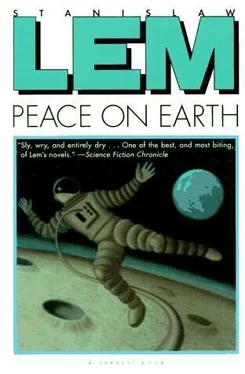Did I have reason to fear my right hemisphere? I could think about this without worrying, because It couldn’t know what I thought unless I told It by hand signals. Human beings are so constructed that they don’t know what they know. What a book contains can be learned from the contents page, but there’s no contents page in the head. The head is like a full bag; in order to see what’s in it you have to pull everything out, item by item. Groping for a memory in your head is like groping in a bag with your hand.
Tarantoga paid the hotel bill, and as we drove to the airport at dusk and then waited in the terminal, I went over everything that had happened after my return from the Calf, to see how much I could remember. Earth had changed completely. There was total disarmament. Even the superpowers no longer had the money to continue the arms race. The more intelligent the weapons, the more they cost. That was the real reason for the Geneva Agreement. In Europe and in the United States no one wanted to enlist in the army. Men were replaced by machines, but one machine cost as much as a jet plane. Live soldiers surrendered the field to nonliving soldiers, who weren’t robots, either, but simply small computers inserted into rockets, self-firing firearms, and tanks like giant bedbugs, flat, because no space was needed for a crew, and if its computer was knocked out, a spare took over. Since command communications were vulnerable to disruption, the machines were made more and more autonomous, and therefore became more and more expensive. I couldn’t recall who came up with the idea of moving the arms race to the moon. Not in the form of weapon factories but through the so-called planet machines. These machines had been in use a couple of years for exploring the solar system. Remembering this, I noticed that a number of details were missing. Had I known them before or not? One usually knows, when one can’t remember something, whether or not one knew it in the first place, but I didn’t. I must have read about the new Geneva Agreement before my mission, but I wasn’t sure. The planet machines were built by several companies, mostly American. They were unlike anything industry had produced before. Not factories and not robots but something in between. Some resembled giant spiders. Of course there was a lot of debate, a lot of protests that they shouldn’t be armed but used only for mining and that sort of thing, but when it came to transporting the weapons to the moon, it turned out that the countries who could afford it already had self-programming mobile rocket launchers, cannon able to travel underwater, fire-throwers able to travel underground like moles, and laser artillery that could move like tanks and trigger, with salvos of intense radiation, nuclear fusion reactions that would vaporize everything, themselves included. Each country could program on Earth its own planet machines, which were then transported to the moon and placed in their respective sectors by the Lunar Agency, especially created for that purpose. The principle of parity was adhered to, how much of this and that could be put up there, and various international commissions watched over this whole military exodus. Scientists and generals from each country were allowed to verify that their devices were unloaded on the moon and in working order, then they all had to return to Earth together. In the twentieth century such a solution would have been senseless because the arms race wasn’t so much a matter of production as of research, innovation, which in those days depended entirely on people. But these new machines worked on a different principle, one borrowed from the natural evolution of plants and animals. These were systems capable of auto-optimization, speciation, and ramification, which means they could change themselves and multiply. I was pleased with myself that I had been able to remember that. Was the right hemisphere of my brain, interested mainly in women’s behinds and cake and hating green ties with brown dots, able to grasp such concepts? How could Its memory, then, be of value militarily? But if it wasn’t, I reflected, all the worse for me, because I could swear up and down that It knew nothing but no one would believe me. They’d grill It, that is grill me, and if they didn’t obtain what they wanted with the signs I taught It they’d use better teaching, better signs, and not let go for anything. The less It knew, the more trouble I was in. My life, even, might be at stake. This was not paranoia. I continued to dig into my memory.
On the moon, the electronic evolution of new weapons was to begin. In this way, despite disarmament, no nation would be defenseless, because it would own a self-perfecting arsenal. And any surprise attack by an enemy, war without declaration, was impossible now, because to commence hostilities a government first had to ask the Lunar Agency for permission to use its sector on the moon. There was no way to hide this, and the side threatened would also apply for permission, and that would begin the return of the means of annihilation to Earth. The whole point was that the moon be inaccessible.
Neither people nor probes could be sent to learn what military capability a given nation had at its disposal. A clever plan, but at first the project met with strong resistance from the generals and politicians. The moon was to be a testing ground and laboratory for military evolution within the sectors allotted to the various nations. The first order of business was to make sure there was no conflict between the sectors. If a weapon developed in one sector attacked and destroyed a neighbor’s weapon, that would upset the balance of power. The day such news came from the moon, there would be an immediate return to the previous situation and very likely war, a war conducted with modest means at first but in short order the nations would all rebuild their arms industries. The programs of the moon systems, written by the Lunar Agency in conjunction with multinational commissions, contained locks to keep the sectors from attacking each other, but that protection was considered insufficient. As before, nobody trusted anybody. The Geneva Agreement had not turned men into saints or international diplomacy into a convocation of angels. For that reason, after the transporting was completed, the moon was declared off-limits to everyone. The Lunar Agency itself could not enter there. If a defense program in any of the testing ranges was destroyed or breached, all Earth would know about it in an instant, for each sector bristled with sensors that worked automatically and around the clock. They would sound the alarm if any weapon, even a metal ant, crossed the boundary into the belt that was no man’s land. But even this wasn’t guarantee enough. The guarantee was the so-called doctrine of ignorance. Each government knew that better and better weapons were being created in its sector, but it did not know their value vis-à-vis the weapons being created in the other sectors. It couldn’t know, because the course of any evolutionary process is unforeseeable. This had been proven ages before, but the rigid politicians and generals were unreceptive to scientific argument. It wasn’t logic that convinced them; it was the increasing economic ruin caused by the traditional arms race. Even a fool could see that one didn’t need a war, nuclear or otherwise, to destroy oneself; the rising cost of weaponry could do that quite nicely. Since disarmament negotiations had been unsuccessful for decades, the moon project seemed the only solution. Every nation could feel it was powerful militarily because of its moon arsenal, but it had no way of knowing how its arsenal compared with those of the other nations. Since no one therefore could count on victory, no one would risk going to war.
The Achilles heel of this solution lay in the monitoring of it. The experts knew from the start that the first thing the programmers of each country would try to do is send to the moon machines capable of neutralizing the monitoring system. Not necessarily by attacking the surveillance satellites directly; it could be a more devious method, one more difficult to detect, such as invading the communication network and falsifying the data transmitted to Earth and the Lunar Agency. My memory of this seemed intact, so I felt calmer as I boarded the plane with Tarantoga. Settling into my seat, I again took to probing what I remembered.
Читать дальше












